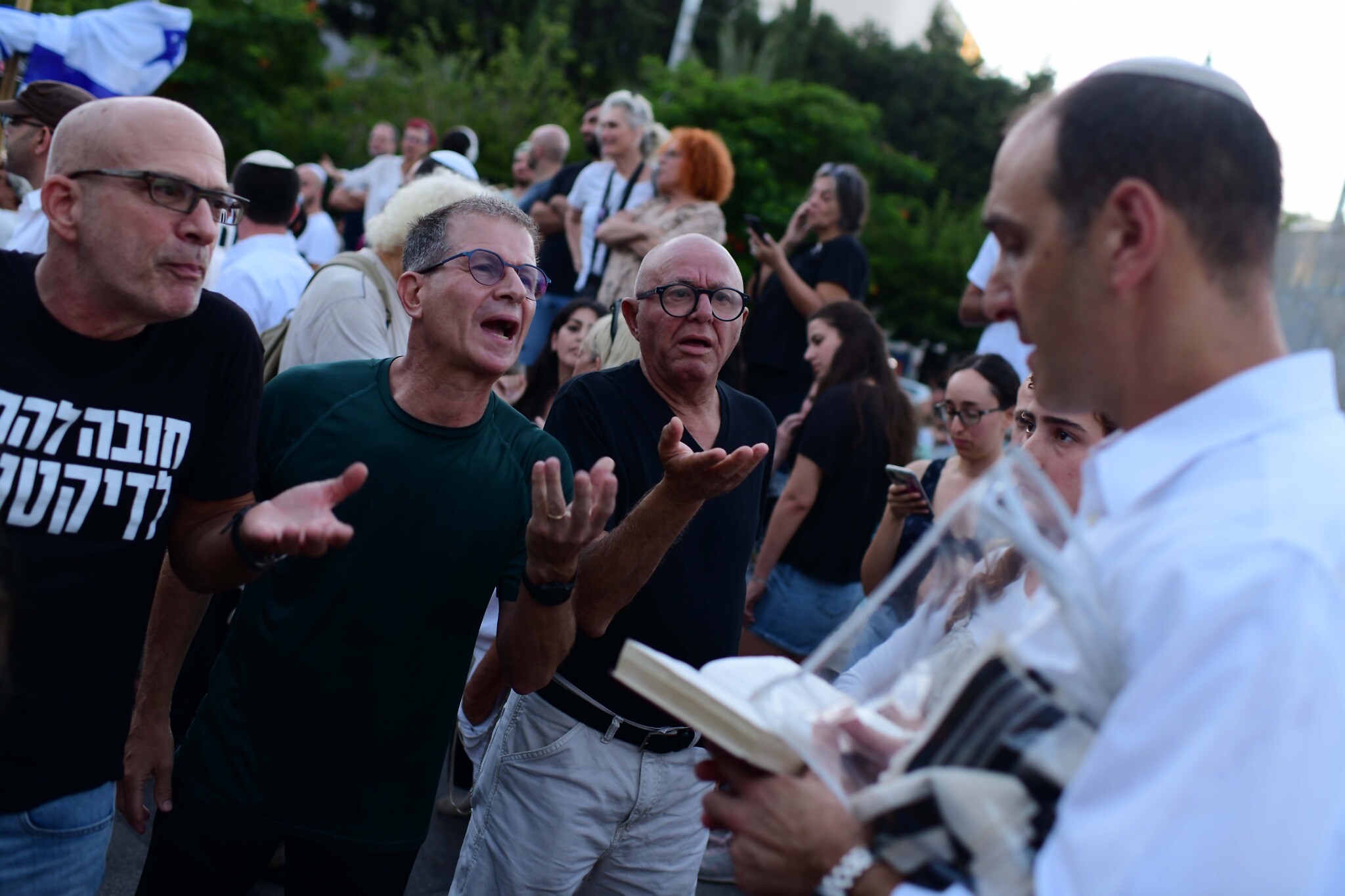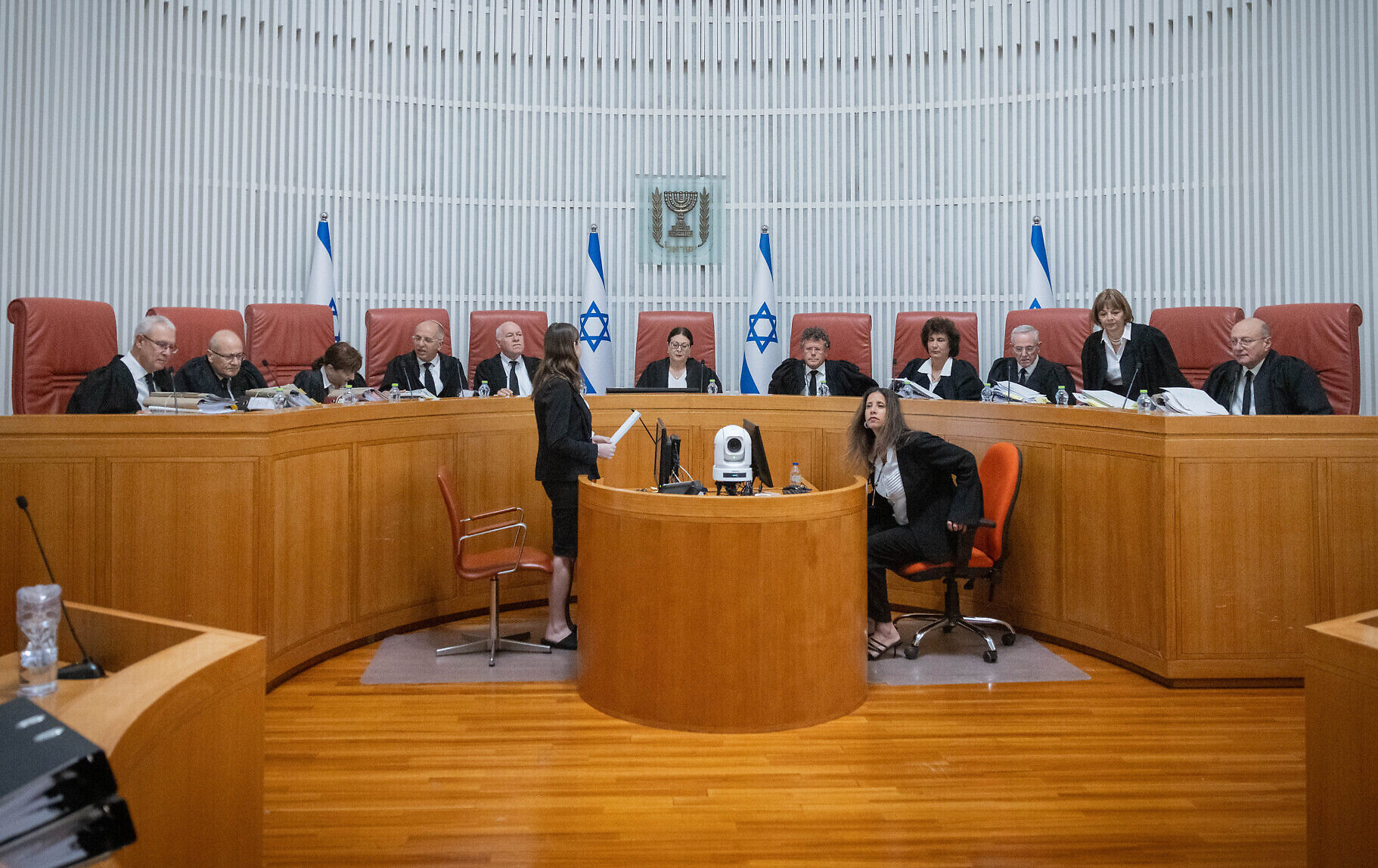Tens of thousands were set to rally nationwide on Saturday night against the government’s judicial overhaul for the 39th week after a week that saw the country’s religious-secular divide bitterly exposed by Yom Kippur clashes at a public prayer service in Tel Aviv.
Organizers said that this week’s protests would highlight the fractious and destructive nature of Prime Minister Benjamin Netanyahu’s rule.
“He is an expert in dividing and splitting people on sectarian lines, religious vs. secular, left against right — divide and conquer,” the organizers said in a statement ahead of the protests. “The economy is collapsing and all we get is provocations and the continued dismantling of democracy.
“On Saturday night we will all meet at Kaplan [Street] — bolstering our ranks, with straight backs, uniting to express the call for democracy in a massive solidarity rally,” the statement said.
Organizers said that Saturday’s demonstrations would be held at approximately 150 locations across the country, with a march from Dezengoff Square beginning at 7 p.m., and the central rally starting at 8 p.m.
Get The Times of Israel's Daily Edition by email and never miss our top stories
The protests come after a religious organization attempted to hold a public Yom Kippur prayer service in the heart of Tel Aviv with an improvised gender divider, sparking bitter confrontations between organizers and attendees and protesters, and unprecedented scenes of anger and accusations on the Jewish Day of Atonement earlier this week.

Activists opposed to a gender-separated public prayer event confront worshippers in Dizengoff Square, Tel Aviv, on Yom Kippur eve. September 24, 2023. (Tomer Neuberg/Flash 90)
The city claims Rosh Yehudi, which has sought to increase Orthodox devotion in the largely secular city, violated the conditions of its license by erecting a makeshift bamboo barrier with Israeli flags as it held services at Dizengoff Square, which the city had banned.
It subsequently barred them from holding events in the city for the Sukkot festival that started Friday evening.
Over Yom Kippur on Sunday and Monday, heated arguments broke out around Rosh Yehudi’s religious services, with worshipers forced to decamp by angry protesters who say gender segregation — traditional in Orthodox Jewish prayers — is inappropriate in public spaces.
The city had said the event could go ahead but prohibited Rosh Yehudi from erecting a gender divider at the event. The organization appealed the prohibition with the Supreme Court, which rejected the petition, siding with the ruling of a lower court in favor of the Tel Aviv municipality.
This week’s events have been seen by many as an extension of the societal conflict unleashed by the government’s judicial overhaul, which has spread to multiple areas of life and overlaps with sharply divergent visions of the country’s future and its character.
The protests came as the High Court deliberated petitions against the reasonableness law, although it is not expected to rule for a number of weeks, if not months.

The High Court of Justice holds a hearing on petitions against the government’s prime minister recusal law at the Supreme Court in Jerusalem, September 28, 2023 (Chaim Goldberg/Flash90)
Earlier this month, an unprecedented panel of all 15 justices presided over a highly charged session in response to petitions against the law, enacted in July, which restricts judicial review of government decisions using the rubric of reasonableness.
The law is the only component of the coalition’s broader judicial overhaul program that has been passed by the Knesset so far, although legislation that gives the coalition almost complete control of the Judicial Selection Committee, and thus of appointing Israel’s judges, passed its first reading in March and could be passed at short notice at any time.
Like other parts of the radical reform agenda, the reasonableness law faced massive opposition from protest groups and opposition parties.
A court ruling striking down a Basic Law would be unprecedented. If the coalition were not to abide by such a ruling, it would potentially cause a constitutional crisis.
The High Court also held hearings this week on petitions against a government law that would bar the courts or attorney general from court or the attorney general from ordering a prime minister to step aside.


